The Appalachian Trail and Blue Ridge Parkway represent two of America’s most iconic natural landscapes, stretching across 14 states and offering unparalleled wilderness experiences. These interconnected routes traverse rugged mountain terrain, providing hikers, travelers, and nature enthusiasts with breathtaking views, diverse ecosystems, and challenging recreational opportunities through the Appalachian Mountain range.
What Makes Appalachian Trail Unique?

The Appalachian Trail is a 2,190-mile footpath extending from Georgia to Maine, representing the longest hiking-only trail in the world. Established in 1937, this remarkable route crosses through diverse geographical regions, offering hikers an extraordinary journey through wilderness, national forests, and scenic mountain landscapes.
Key Trail Characteristics
| Trail Attribute | Details |
|---|---|
| Total Length | 2,190 miles |
| States Traversed | 14 |
| Elevation Range | Sea level to 6,643 feet |
| Average Completion Time | 5-7 months |
What Gear Do Hikers Need?

Successful Appalachian Trail hiking requires strategic gear selection:
Essential Gear Checklist
- Backpack: Lightweight, 50-65 liter capacity
- Shelter: Ultralight tent or hammock system
- Sleeping Gear: Compact sleeping bag, rated for expected temperatures
- Footwear: Durable, waterproof hiking boots
- Clothing: Moisture-wicking layers, rain protection
How Challenging is the Blue Ridge Parkway?
The Blue Ridge Parkway spans 469 miles through Virginia and North Carolina, offering a different experience from the Appalachian Trail. While not a hiking trail exclusively, it provides numerous access points and scenic overlooks for outdoor enthusiasts.
Scenic Highlights
- Elevation Range: 650 to 6,053 feet
- Total Scenic Stops: Over 200 scenic overlooks
- Key Attractions:
- Grandfather Mountain
- Linville Gorge Wilderness
- Mount Mitchell State Park
What Safety Precautions Should Travelers Consider?
Trail Safety Guidelines
- Weather Preparedness
- Check seasonal forecasts
- Carry appropriate clothing layers
-
Understand potential temperature variations
-
Navigation Tools
- Topographic maps
- GPS device
- Compass
- Emergency communication device
How to Plan Your Journey?
Trip Planning Strategies
- Research trail sections thoroughly
- Obtain necessary permits
- Plan resupply points
- Understand physical fitness requirements
- Consider seasonal variations
What Wildlife Might You Encounter?
The Appalachian Trail and Blue Ridge Parkway host diverse wildlife:
- Black bears
- White-tailed deer
- Wild turkeys
- Various bird species
- Small mammals
Wildlife Safety Tips
- Maintain safe distances
- Store food properly
- Avoid direct interactions
- Carry bear spray in designated areas
What Are the Best Times to Visit?
Seasonal Recommendations
| Season | Characteristics | Recommended Activities |
|---|---|---|
| Spring | Mild temperatures, blooming flora | Hiking, wildlife viewing |
| Summer | Warm, occasional thunderstorms | Extended trail exploration |
| Fall | Spectacular foliage, cooler temperatures | Photography, scenic drives |
| Winter | Snow-covered landscapes | Limited hiking, scenic views |
Conclusion
Exploring the Appalachian Trail and Blue Ridge Parkway offers an unparalleled outdoor experience, combining natural beauty, physical challenge, and profound wilderness immersion.

